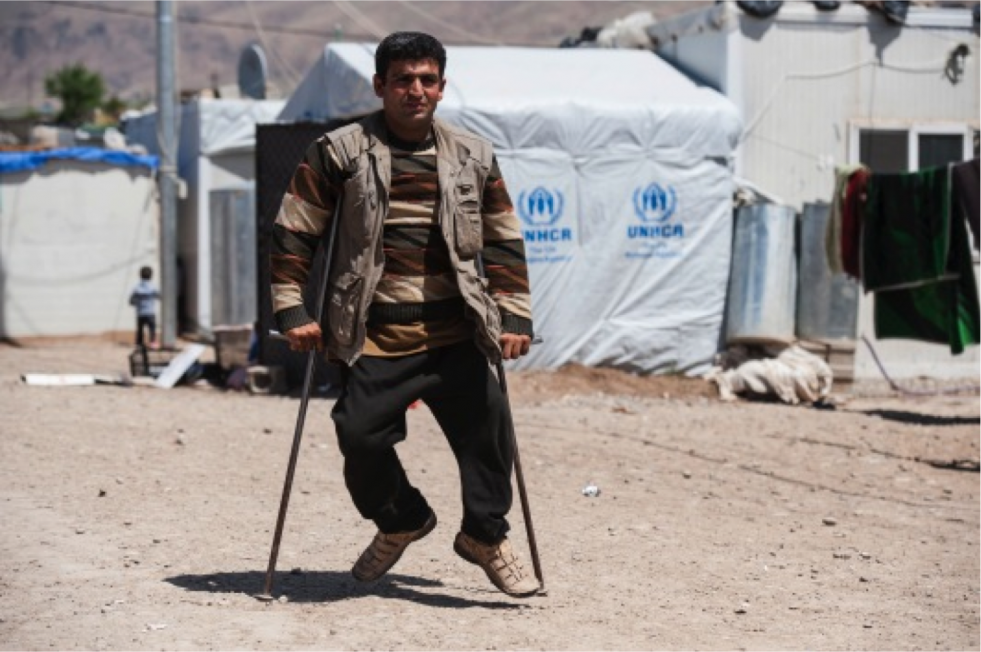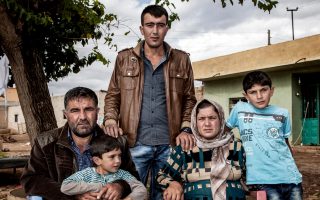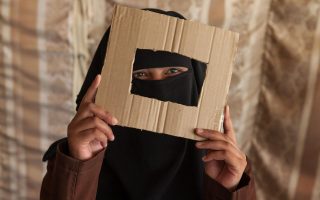
Gulber moves around Basirma Refugee Camp on homemade crutches. © UNHCR/ S.Rich
Coping in a refugee camp is difficult at the best of times but when you are disabled, accessing communal services and living in temporary shelter brings added complications. The UN Refugee Agency (UNHCR), with the support of donors like you, is working to address the concerns of disabled refugees like Gulber in Basirma refugee camp, Iraq.
Gulber’s grocery store is humming with activity. Mothers squeeze the fresh vegetables and fruit on display, men collect large bottles of drinking water to carry home and children nag their parents for brightly coloured packets of sweets. Gulber, store owner and manager, busily takes payments and directs his store workers to restock shelves.
The scene could be from any grocery store around the world but this well stocked stall is actually in Basirma Refugee Camp in Northern Iraq and in just six short months has grown from a simple table selling vegetables to a fully formed self-service store.
Gulber, 31-years-old, is from Syria and has always been a store owner; “In Syria I sold vegetables. Syria is known for her beautiful produce. Here it made sense to do something that I knew. I saw a gap in the market as there were no stalls in the camp and set up my table and within months it’s grown to this. I haven’t let anything stop me, not even my legs. ”
Gulber contracted polio as a baby and his legs are withered and almost immobile. He uses hand-made crutches to get around the camp where he lives, balancing and swinging on the metal poles as if they are his legs.
“The forgotten refugees are disabled refugees. We and our families do not have the help we need and it makes it hard for everyone,” says Gulber.
“When others need to get to a communal toilet it is no problem for them but for me, for other disabled people, it is difficult to move on the uneven ground, or walk long distances. It is difficult to get into a tent with crutches. It is difficult for us to find work. Like everyone else we just want to be able to look after ourselves but we can’t do this.”
Gulber has been in Basirma Refugee Camp since August 2013. Along with his two younger brothers, he was one of more than 40,000 Syrian’s who crossed into Iraq in just two weeks.
“It wasn’t safe in Syria and that is why we came here – the bombings were getting worse and worse – my parents did not want to leave because they are old but I talk with them every day to make sure they are ok”
After a difficult one-hour walk across the border soldiers on the Iraq Kurdistan side met them and transported them to a reception site, before UNHCR registered and started to distribute much needed aid.
“We were all given tents to shelter, blankets, sleeping mats, things to cook with,” says Gulber. “I want the situation to get better in Syria – surely it must? If it does I would go back to Syria. Inshallah it will get better…”
“I am suffering here. Syria is everything to me. It is my birthplace, my homeland, how can one live away for ever. We all need help, all of us, not just the people here in this camp but all of the Syrians who have been driven from their homes by this war.”





